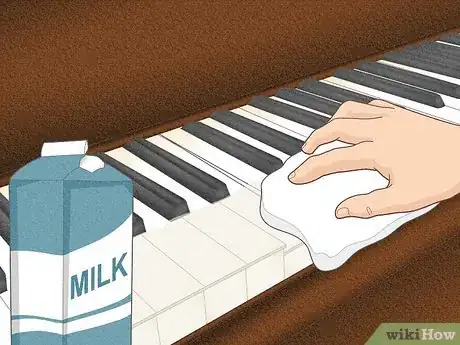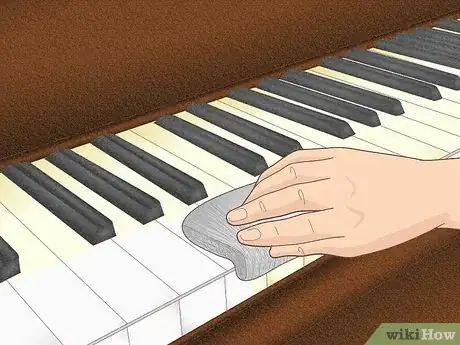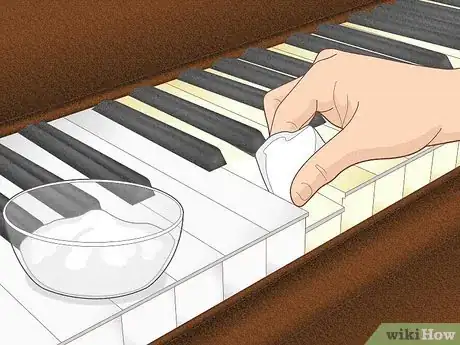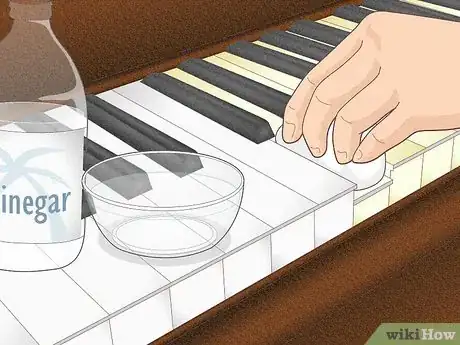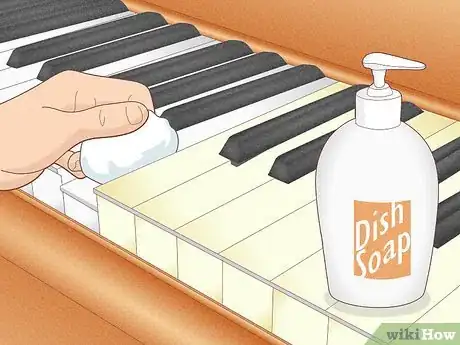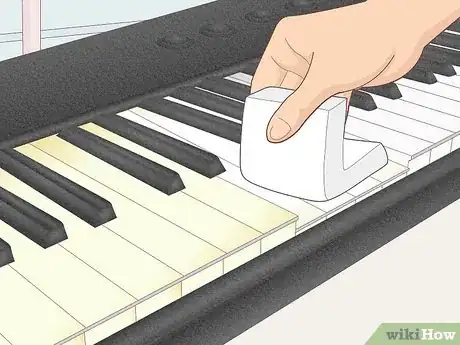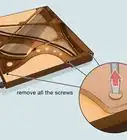This article was co-authored by Michael Noble, PhD and by wikiHow staff writer, Janice Tieperman. Michael Noble is a professional concert pianist who received his PhD in Piano Performance from the Yale School of Music. He is a previous contemporary music fellow of the Belgian American Educational Foundation and has performed at Carnegie Hall and at other venues across the United States, Europe, and Asia.
This article has been viewed 23,739 times.
The piano is a beautiful instrument, but it can become a bit of eyesore when the keys start looking yellow. Before giving your instrument some much-needed TLC, take a closer look at what type of keys you have. Typically, ivory keys are off-white, porous and made with 2 connected pieces. Plastic keys are a lot smoother, and have a clear varnish on top.[1] Once you’ve figured out what kind of keys you have, choose from a variety of different household substances to get your keys looking white and polished.
Steps
Ivory Keys
-
1Apply white toothpaste to the surface of your ivory keys. Squeeze a pea-sized amount of plain white toothpaste on a soft cloth. Rub the toothpaste gently into the ivory surface, focusing on 1 key at a time.[2]
- Only use white toothpaste for this—gel toothpaste can hurt your ivory keys in the long run.[3]
- Try not to leave the toothpaste on the ivory piano keys for more than 30 seconds.
-
2Wipe away the toothpaste with a cloth dampened with milk. Grab another clean cloth and dampen it with a few drops of whole milk. Wipe down the key with milk to clean off the instrument and really polish the surface. Once each key is clean, dry it off with another soft, lint-free cloth.[4]
- Some sources recommend cleaning ivory with lemon juice. However, lemon juice can eventually break down the ivory, which isn’t ideal. Milk, on the other hand, helps protect the ivory with calcium and other fatty acids.
Advertisement -
3Rub the keys with a white vinyl eraser for a simpler solution. Move the eraser down each key, dragging it in slow, careful motions. Don’t move too quickly—otherwise, tiny eraser chunks might fall into the cracks of your piano keys.[5]
-
4Polish away the yellow stains with a fine steel wool pad. Look for steel wool marked as #0000, or labeled as “very fine.” Rub the wool gently over the ivory to buff away any unwanted yellow stains on the keys.[6] Scrub down 1 key at a time, moving the wool pad in smooth, vertical motions.[7]
- Only do this once in a while. Although this can clear away pesky stains, it may also wear down the ivory.
-
5Wipe down each key with a mayonnaise-yogurt mixture. Mix a spoonful of plain yogurt and mayonnaise together in a bowl. It may seem strange, but dip a clean cloth into the mixture and rub down each key individually. Then, dry off your clean ivory keys with a new cloth.[8]
- The bacteria in the mayonnaise and yogurt actually help whiten the keys.
-
6Clear away stubborn stains with rubbing alcohol. Pour a couple drops of rubbing alcohol onto a soft cloth. Wipe down each individual key, which will help freshen up your instrument. Then, take a clean cloth and wipe away any leftover alcohol.[9]
- You only need a few drops for this—if you use too much alcohol, it’ll drip down the cracks of the instrument.
-
7Place your keys in direct sunlight to whiten the keys. Over time, sunlight can actually whiten ivory. If possible, see if you can move your piano into a sunnier part of your home, so your keys can lighten naturally over time.[10]
- This remedy only works with ivory keys. If you have plastic keys, the sun will end up yellowing them.
-
8Whiten your ivory keys with diluted vinegar. Mix four spoonfuls of tap water with a spoonful of white vinegar. Dip a piece of flannel or cheesecloth into the water and wipe down each individual key to get rid of any yellow staining.[11]
- Don’t use pure vinegar for this—acid can wear down the ivory over time.
- You can also wipe down your keys with an old T-shirt.
Plastic Keys
-
1Go over each key with a few drops of dish soap. Pour a couple drops of dish soap onto a clean, slightly damp cloth and wipe down each individual key.[12] Pick out a soft white cloth to get the job done; unfortunately, colored washcloths may transfer their dye to the piano keys.[13] To be safe, wipe off each individual key with a dry cloth once you’re done cleaning them.
- The washcloth should be damp, but not dripping wet. If it’s too wet, then water may drip in between the keys.
-
2Wipe down electric piano keys with a melamine foam sponge. Move a slightly damp sponge up and down each individual key, which may help whiten the instrument. Don’t use a wet rag or washcloth to clean your electric piano, or you may damage your instrument.[14]
- Electric or digital pianos are created with a lot of electrical components, so water isn’t a great cleaning option.
-
3Get rid of stubborn stains with a diluted vinegar mixture. Mix 4 spoonfuls of warm water with 1 spoonful of white vinegar together as your cleaning mixture. Dip a clean cloth into this mixture so it’s slightly damp, then clean off each individual key. Dry off the clean piano keys completely once you’re done.[15]
- Soft cloths, like cheesecloth or flannel, are good options for this.[16]
Expert Q&A
Did you know you can get expert answers for this article?
Unlock expert answers by supporting wikiHow
-
QuestionHow do I keep my piano keys from getting grimy?
 Michael Noble, PhDMichael Noble is a professional concert pianist who received his PhD in Piano Performance from the Yale School of Music. He is a previous contemporary music fellow of the Belgian American Educational Foundation and has performed at Carnegie Hall and at other venues across the United States, Europe, and Asia.
Michael Noble, PhDMichael Noble is a professional concert pianist who received his PhD in Piano Performance from the Yale School of Music. He is a previous contemporary music fellow of the Belgian American Educational Foundation and has performed at Carnegie Hall and at other venues across the United States, Europe, and Asia.
Professional Pianist
Warnings
- Some piano experts recommend using an ivory scraper to get rid of really stubborn yellow stains from the key tops. However, ivory scrapers can damage your ivory key tops if you use them incorrectly. Before investing in this kind of tool, ask a piano technician for advice.[19]⧼thumbs_response⧽
- Use a different cleaning cloth for your black and white piano keys. This can prevent any black paint from permanently smudging onto your white keys.[20]⧼thumbs_response⧽
- Avoid using harsh chemicals or sprays to clean and sanitize your instrument. This will hurt your instrument instead of sanitizing or cleaning it.[21]⧼thumbs_response⧽
Things You’ll Need
Ivory Keys
- White toothpaste
- Milk
- White vinyl eraser
- Soft cleaning cloth
- Fine steel wool pad
- Mayonnaise
- Yogurt
- Rubbing alcohol
- Vinegar
- Water
- Flannel or cheesecloth
Plastic Keys
- Dish soap
- Melamine foam sponge
- White vinegar
- Water
References
- ↑ https://www.musictoyourhome.com/blog/how-to-clean-piano-keys-without-damage/
- ↑ https://joshuarosspiano.com/how-to-whiten-ivory-piano-keys/
- ↑ https://www.merriammusic.com/blog/pianos-blog/unstain-yellowing-piano-keys/
- ↑ https://joshuarosspiano.com/how-to-whiten-ivory-piano-keys/
- ↑ https://www.musictoyourhome.com/blog/how-to-clean-piano-keys-without-damage/
- ↑ https://www.merriammusic.com/blog/pianos-blog/unstain-yellowing-piano-keys/
- ↑ https://www.modernpiano.com/How-to-Restore-Yellow-Piano-Keys-1-47.html
- ↑ https://www.musictoyourhome.com/blog/how-to-clean-piano-keys-without-damage/
- ↑ https://joshuarosspiano.com/how-to-whiten-ivory-piano-keys/
- ↑ https://www.merriammusic.com/blog/pianos-blog/unstain-yellowing-piano-keys/
- ↑ https://www.merriammusic.com/blog/pianos-blog/unstain-yellowing-piano-keys/
- ↑ https://www.modernpiano.com/How-to-Restore-Yellow-Piano-Keys-1-47.html
- ↑ https://wcmovingandstorage.com/moving-blog/how-to-whiten-piano-keys/
- ↑ https://www.modernpiano.com/How-to-Restore-Yellow-Piano-Keys-1-47.html
- ↑ https://wcmovingandstorage.com/moving-blog/how-to-whiten-piano-keys/
- ↑ https://www.musictoyourhome.com/blog/how-to-clean-piano-keys-without-damage/
- ↑ https://www.modernpiano.com/How-to-Restore-Yellow-Piano-Keys-1-47.html
- ↑ https://www.musictoyourhome.com/blog/how-to-clean-piano-keys-without-damage/
- ↑ https://joshuarosspiano.com/how-to-whiten-ivory-piano-keys/
- ↑ https://www.musictoyourhome.com/blog/how-to-clean-piano-keys-without-damage/
- ↑ https://www.musictoyourhome.com/blog/how-to-clean-piano-keys-without-damage/

